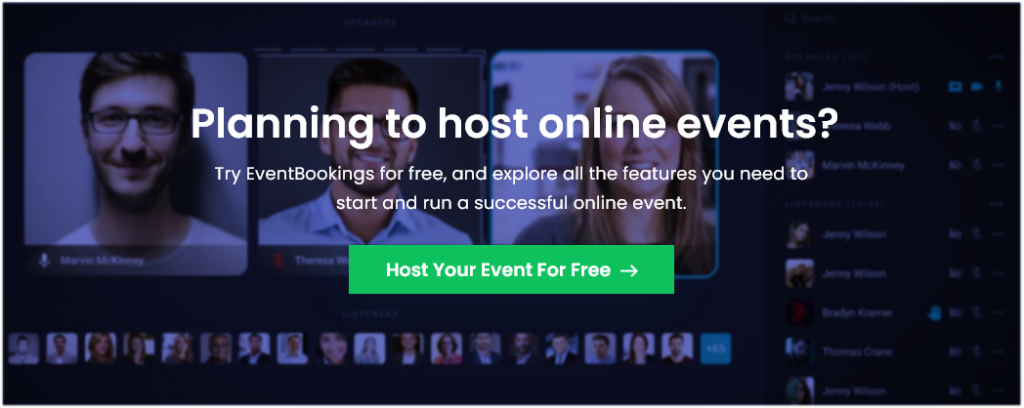2020 has really tested event organisers, causing them to get creative on how to run and manage events through social distancing.
It’s not all bad news though. We’ve discovered more and more ways to connect online and seen an influx of virtual event platforms spanning from teleconferencing to even holding events inside video games.
With virtual events becoming the new normal, companies and groups can now reach their audience worldwide, generating more buzz and leads for their brand. Virtual event’s ability to reach a larger number of global attendees has made it one of the most powerful online marketing and lead-generating weapon for a brand or company.
In this article, we are going to explore the fundamentals of virtual events and discuss the best practices of organising your first virtual event successfully.
Table of contents:
- Identify and target the right audience
- Have clear objectives
- Set your budget
- Choose the right event type
- Pick the right event management platform
- Get sponsors involved
- Create a multifaceted marketing plan
- Promote on social media
Identify and target the right audience
It goes without saying that there’s a big difference between online and live audiences. People often multitask during online events and navigating away once they lose interest. By identifying and understanding your audience, you can keep them engaged and connected throughout your event.
Here are a few things ways to define your target audience –
- Don’t try to please everyone and play to your specific demographic
- Create an attendee persona profile
- Clarify what your audiences should take away from the event
- Have an engaging event brand message
Have clear objectives
Whether it is physical or virtual, organising an entire event takes a lot of strategic planning, time, and proper execution. To make sure you’re making the most out of your virtual event, it’s essential to set clear goals and reasonable objectives. For instance, you may want to start with the “why” behind your event. Are you looking to increase brand awareness, or to promote networking?
Whatever your event objective is, thoroughly analysing and defining your event will help you choose your relevant key performance indicators (KPIs) through which you can adequately measure your event’s success. While a virtual event may differ to an in-venue event, here are some common virtual event objectives to keep in mind.
Make your virtual event SMART-
- Specific: Specific to a particular niche, audience and event motto.
- Measurable: Audience engagements, responses and overall event performances tracked and measured by analytics and event management software.
- Attainable: Realistic and achievable event objectives that can be fulfilled by the event management and strategy execution.
- Relevant: Keeping the event goal relevant to targeted attendee expectations and purposes.
- Time-bound: Objectives that can meet the specific deadlines from event draft designing to successful execution.
Set a budget
Once you define your core event objectives and audience, your next task to tackle is the budget, expenses, and revenue. For a viable event budgeting, you need to identify areas of cost and revenue. In addition to that, you also need to figure out the fixed and variable expenses of every event.
While less involved than a venue event, you may still find yourself needing additional revenue through sponsors or registration fees. In an online setting, the whole event budgeting process starts with choosing a suitable registration system as this will help you sell tickets and keep track of your funds.
Make sure all the budgeting details are worked out ahead of the event time. Don’t forget to plan to allocate for any last-minute expenses!
Choose the right event type
Now it’s time to decide on what format will best serve your attendees and event objectives. Here are some common types of virtual events:
- Slidecast and webcast – Slidecast is a simpler version of a podcast. Slidecast consists of video and audio recordings of live slideshow presentations, which are distributed, syndicated, and broadcasted online. On the other hand, a webcast uses streaming media technology to distribute the audio and visual presentation to many viewers and listeners online, live, or on-demand. Webcast also goes by the name “virtual keynotes.”
- Webinar – Webinar is an audience-focused online event scheduled at a particular time, where speakers deliver a presentation to a broad audience. The audience can directly participate in webinars by using available interactive tools. They can submit their questions, respond to polls regarding the given topic, and connect to the speakers online.
- Web conferencing- Web conferencing is an interactive form of online event that gathers a large group of attendees with similar interests for live presentations, meetings, training, summits, job fairs, and so on.
Pick the right event management platform
With the right tools and event management software, your virtual event can allow attendees to engage, interact, network, collaborate, and share information with your business. Most of this software is designed specifically to help promote and organise your events. Moreover, the right event management software will save you both time and money.
When choosing the right virtual event platform, here are some of the standard features you may want look for-
- Customisable event landing web page with branded logos
- Customisable ticket registration capabilities
- Customisable email templates
- Social media integration
- Attendee management
- Onsite check-ins and live event statistics
- Real-time analytics
Many event management platforms also let you incorporate additional features, like – live chat, live polls, etc., to keep the event engaging and let the audience feel involved.

Get sponsors involved
In a virtual event setting, creating a sponsorship package and reaching out to the event sponsors is the quickest way to improve your brand’s perception, and drive sales.
Sponsors seek exposure that will directly benefit their brands and business. So in an online setting, you need to be strategic on how to give your sponsors exposure while leaving a positive impression on your attendees. Here are some ideas:
- Featured guest blog post on your event registration page including sponsor’s logos and messages
- Sponsored breakout sessions
- Sponsored Q&A sessions
- Sponsored virtual gifts for the attendees
- Live ‘demo’ presentation’ in the platform
- Sponsored ice-breaking activities and online gamification
Create a multifaceted event marketing plan
There are many ways to market and monetise your virtual event! Here are some of the strategies that you may try:
- Engaging content production- The most efficient way to promote your event is to capture target audiences with fun, engaging, relevant, and original content. Keep your event blog active and call for guest articles from your sponsors.
- Press release- A press release is a great way to create a buzz about your upcoming virtual event, just as much as it is for the physical, in-person event. You can share information about the event themes, topics, guest speakers, sponsors, and takeaways in your event PR and send it to popular press release sites and media outlets.
- Email marketing- Along with providing links and reminders from your event management platform, the thing you must include in your virtual event strategy is email marketing. Make sure your email looks great on all devices with attention-grabbing CTA buttons. You can also offer special discounts, and sneak peeks of the events and giveaways to whoever signs up for your email newsletter as well.
- Digital ad space- In an online setting, there are plenty of ways to market, monetise, and promote your sponsors, and utilising digital ad space is one of the most effective options. You can include display ads, banners, and pop-up ads to exhibit your sponsors or redirect the visitors to your event website or registration page.
Promote your event on social media
Social media plays a significant role both in engaging your attendees throughout your online event and promoting the event. Below we’ve listed some ways to generate some buzz:
Social Media Stories – Let audiences engage with an ever-updating and interactive narrative! Make use of clickable links that directly take them to the event registration pages or a blog site with further event information.
Live Streams- Popular social media like Facebook, Instagram, LinkedIn, and TikTok all have live streaming options that can be used to promote your event. Live streaming as a part of your virtual event promotion also builds trust and authenticity of your upcoming event.
You can make the most out of your virtual event promotion and marketing campaigns almost single-handedly via social media. Check out our blog post – Event Marketing on Social Media to get a complete and latest schemes about social media promotion and marketing strategies.
Final verdict
Like any events, virtual events are all about planning and promoting. By choosing the right event management software, you can support both of these key areas and run a successful event!




